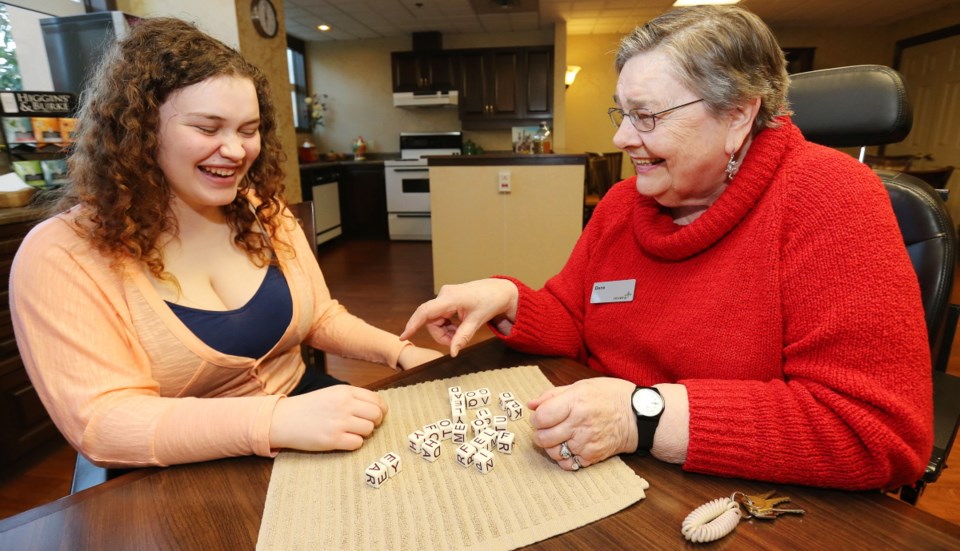One of the things Dene Mainguy didn’t anticipate as she moved through her senior years was the way she would disappear.
It was most noticeable on city buses, which she relied on to get around with her walker.
“All of a sudden, you’re invisible — they just don’t see you,” said the 81-year-old, who now uses a wheelchair. “Every once in a while, a bus driver would have to shout out: ‘Walker coming through, please move.’ ”
But Mainguy had a diametrically different experience recently, as one of 10 Saanich seniors who participated in a film project aimed at combating ageism. The Age Is More project brought young women into the Kensington independent living facility on Shelbourne Street to interview seniors about their lives as women in a different time.
Each senior Saanich woman became the subject of a short documentary, posted online at ageismore.com.
The project was a joint effort by Revera, a provider of retirement homes, and not-for-profit Reel Youth, a program that helps young people, adults and organizations produce films. The first project was filmed in 2013 in White Rock, and similar documentaries were created in Calgary, Toronto, Ottawa and Burlington, Ont.
In one video, Joyce Johnson tells her interviewers about life as an air force bomber-station mechanic. Rosemary Kitching talks about the joy she gets from square dancing. And Win Cushing explains sacrificing a chance to join the Olympic swim team for a better education and a bookkeeping career.
Zoe Miles, film festival director and programs manager, said bringing young and old people together was a way to build a bridge between them and dispel stereotypes.
“Both of these demographic groups tend to experience ageism in a certain way,” she said.
Sive Johnson, a 15-year-old Stelly’s Secondary School student, said she was attracted to the project by the opportunity to learn about filmmaking. But she ended up thinking about her elders in a new way.
Johnson said she encounters older people in her community regularly, having grown up going to church.
“I’d had quite a few encounters with elderly people, but nothing this intimate,” Johnson said.
“This interview process really helped me because I realized, I can ask questions like this. It’s OK — people want to tell their stories.”
Johnson interviewed two women, Lucille Danes, an 86-year-old “prankster” who piloted bush planes with her husband, and Nancy Love, 88, a quiet and dedicated women’s shelter volunteer.
“The contrast was surprising because we didn’t expect that much diversity when we were going into the project,” Johnson said.
Most surprising was how forthcoming the senior women were, said Johnson, who plans to ask her own grandparents if she can interview them next.
During her session, Mainguy told her interviewers about joining the navy on a whim as a nurse and opening Hamilton General Hospital’s first psychiatric unit, despite having no formal training in the field.
Among the unit’s patients were several housewives, driven there by the daily drudgery of minding their homes, children and husbands.
“They would come to us for maybe a week, 10 days. And they would be fine,” Mainguy said. “In other words, what they needed was a jolly good holiday.”
Apart from knowledge about how women’s roles have changed, Johnson said there’s one key lesson she’ll take away from the project: A reminder that the women haven’t always been old.
“They were my age once. They were teenagers dealing with the same things I am, albeit in a different context,” she said.
“One day, I will be their age. And we’ve all had similar experiences — we’re just at different points in our journeys.”



